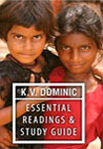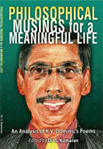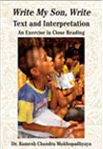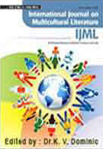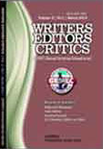Books Review in Detail
Review Of Chandramoni Narayanaswamy’s Review of K. V. Dominic’s Write Son, Write
Chandramoni Narayanaswamy’s Review of Write Son, Write
K. V. Dominic’s Write Son, Write. New Delhi: GNOSIS, 2011.
99 pp. Paperback. Rs. 125. ISBN: 978-81030-25-7.
Chandramoni Narayanaswamy
In this his second anthology of poems, Write Son, Write, Prof. K. V. Dominic emerges as in his first anthology Winged Reason as the champion of peace and kindness to animals, in fact all forms of life including plants and insects-One is tempted to describe him as the Budha of the nuclear age.
The first poem “Write My Son, Write” is a beautiful exposition of a poet’s relevance in the modern age in which poetry has become the unwanted branch of literature. Enraged by the callousness, cruelty and sadism indulged in by men in general, the tortured Earth turns to the poet, the most sensitive being of the human race and coaxes him to write and inculcate the values of kindness, sensitivity and refinement in the minds of his fellow beings. There is rhythm and harmony in all sounds, even in the drone of the mosquito and the movements of worms and insects. While plants and animals dance to the number, man alone strikes discordant notes. All creations of earth are useful and beautiful but man’s pettiness and coloured vision divides them as good and bad; beautiful and ugly. After years of evolution man with brains was created as an experiment which proved to be disastrous for his cruelty has rendered even Christmas, the day of universal love and peace, the blackest day for cattle, fowl and fish butchered in billions for the feast. The religious mafia presents a distorted concept of God to the masses, while the political mafia and intellectual mafia exploit them. Hence the poet has to write, open their eyes and sensitize them.
Man’s heedless vandalism results in drastic climatic conditions and when he feels the pinch he appeals to God. But even He cannot undo the damage and reminds man that he has dug his own grave though He had created an oasis for him (“God Is Helpless” 68). So, life in the not so distant future will be a nightmare which is vividly portrayed in “Water, Water, Everywhere” (P.91).
“An Elegy on My Ma” is a tear jerker. The bereaved son pours out his love, gratitude, anguish and regret for omissions in this moving poem. There is also another poem inspired by personal sorrow-the grievous injuries suffered by his colleague at the hands of fundamentalists (“To My Colleague” 83).
A good part of the book is dedicated to animals. In “Massacre of Cats” (44) and “To My Deceased Cats” (97) the poet has once again given vent to his angst and anger at the death of his four kittens, poisoned by his neighbours, which had earlier found expression in “Ammini’s Lament,” a poem in his first anthology Winged Reason. In contrast to these touching poems is one “A Cow on the Lane” (47) which makes the reader smile-the stoic cow unmoved by the approaching car compelling the poet driver to take another route. Poppy in “Attachment” is another dearly loved kitten who left in a friend’s car and escaped on the way leaving the poet in grief and suspense–wondering whether she was alive or dead. This poem ends on a philosophical note with a prayer to God to bless him with detachment. To him even the oft-condemned crow is a black beauty exploited by the much extolled cuckoo. The poet yearns for the time when the cawing of the crow will be as sweet as the cooing of the cuckoo and Black and White will be equal, living in harmony.
Unlike many writers of his age, Dominic has faith in the younger generation and a lot of goodwill for them He does not deplore their waywardness but highlights their good qualities. The studious concentration of Favitha studying under the vaka tree (“A Desperate Attempt” 49) illustrates this.
In some poems rich tributes are paid to the achievements of women. He hails Aung San Suu Kyi as Asia’s Lady Mandela and bows in admiration to Katie Sportz who sailed solo across the Atlantic, spending seventy days and nights alone on the waves, to raise funds for a project (53, 55). No less is his admiration for a poor but strong-willed woman of the soil undertaking a most hazardous job to eke out a living with dignity and self respect for herself and her children (“Resolution” 75). Other shining examples of noble woman power are Resiya, a true Muslim, who saved the life of an old and helpless Brahmin window, befriended and rehabilitated her (“For the Glory of God” 61) and Sister Mercy (79) devoting herself to the service of the tribals in Madhya Pradesh. Teresa, a sweeper, is forced to contribute a portion of her hard earned salary for the construction of the school building and the poet condemns this practice of forced donation as a ‘kanker of Kerala” (“Teresa’s Tears” 81).
To the sensitive poet plant life is as precious and vibrant as human life. God who created the majestic “Coconut Palm” is the “Architect of architects” (56). Flowers communicate with him and greet him with “Good Morning,” “Bon Voyage” and “Good Health” (“Flowers’ Greetings” 59) His love for plants has inspired another beautiful nature poem “Wagamon” (88).
Dominic is an idealist with a difference because his philosophy is realistic and his approach to life pragmatic. He does not want to waste time singing hymns because God is not fond of flattery and prefers work to prayer as the best form of worship (“Work Is Worship” 95). As averred by P.C.K. Prem in the preface he is indeed the poet of the masses and the drown-trodden.
Ms. Chandramoni Narayanaswamy, (IAS Retd.), is renowned English poet, children-story writer, novelist, short story writer, critic and reviewer from Bhuvaneswar, Orissa, India.

